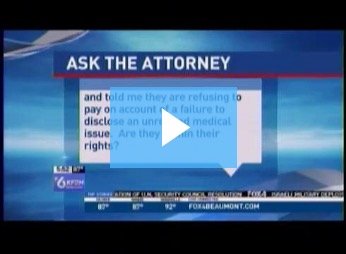Dealing With Traumatic Brain Injuries: Legal and Medical Insights
 Traumatic brain injuries (TBIs) are among the most serious and life-altering injuries an individual can suffer. They can result from a wide range of incidents, including car crashes, falls, unsafe workplaces, explosions and unsafe products. A concussion is an example of a traumatic brain injury. While some brain injuries are mild and can resolve with time, others can lead to permanent disability, cognitive impairment, emotional disturbances, and even death. Understanding the medical implications of TBI and the legal options available to victims and their families is crucial in the aftermath of such a traumatic event.
Traumatic brain injuries (TBIs) are among the most serious and life-altering injuries an individual can suffer. They can result from a wide range of incidents, including car crashes, falls, unsafe workplaces, explosions and unsafe products. A concussion is an example of a traumatic brain injury. While some brain injuries are mild and can resolve with time, others can lead to permanent disability, cognitive impairment, emotional disturbances, and even death. Understanding the medical implications of TBI and the legal options available to victims and their families is crucial in the aftermath of such a traumatic event.
At Gilbert Adams Law Offices, we represent clients in Houston, Beaumont, and statewide who have experienced severe injuries, including TBIs, due to another party’s negligence or wrongful conduct. Our goal is not only to secure compensation for our clients but also to help them understand the scope of their injury, the path to recovery, and the rights they have under Texas law. Contact our office to speak with an experienced Texas personal injury attorney dedicated to securing justice and compensation for traumatic brain injury victims and their families.
Medical Signs and Symptoms of Traumatic Brain Injuries
Traumatic brain injuries occur when an external force impacts the skull or causes the brain to move within the skull, resulting in bruising, bleeding, tearing, or other forms of damage, including loss of consciousness. TBIs are typically classified into three categories: mild, moderate, and severe. Mild TBI, often referred to as a concussion, may involve confusion, headache, dizziness, or loss of consciousness. While these symptoms can resolve with treatment and time, they should not be taken lightly. Even a seemingly minor brain injury can have lasting consequences, particularly if the individual experiences repeated concussions.
Moderate and severe TBIs often require emergency medical care and long-term rehabilitation. Victims may suffer from extended periods of unconsciousness, profound cognitive deficits, memory loss, personality changes, and physical impairments. Recovery from severe TBI is typically prolonged and may never be complete. Victims frequently require ongoing therapy, in-home care, and accommodations for daily living. For families, the emotional and financial toll can be overwhelming.
The symptoms of TBI can vary widely depending on the location and severity of the injury. Some victims may struggle with speech, mobility, or motor skills, while others may experience depression, anxiety, or changes in behavior and temperament. In some cases, individuals with TBI are unable to return to work or maintain personal relationships, creating significant challenges in every area of life.
Diagnosing and Treating TBIs
Diagnosing a traumatic brain injury often begins with imaging tests such as MRIs, which are used to rule out bleeding or swelling; however, MRIs read as normal do not rule out traumatic brain injury or cognitive impairment. Neurological exams and cognitive assessments can be used to help determine the extent of cognitive decline and functional impact on your everyday life. Treatment plans are highly individualized and may include medications, surgical procedures to relieve pressure on the brain, and a range of therapies including physical therapy, occupational therapy, and other counseling.
Long-term care for a TBI may involve a multidisciplinary team of medical professionals, including neurologists, psychiatrists, neuropsychologists, and rehabilitation specialists. The cost of such care can be substantial, particularly when the injury results in permanent disability or necessitates lifelong assistance. Because of this, it is essential for victims and their families to explore all avenues for compensation when the injury was caused by someone else’s negligence.
Legal Aspects of TBI Claims in Texas
When a traumatic brain injury is caused by another party’s negligence—whether a dangerous driver, a negligent property owner, or an employer who failed to provide a safe workplace—the victim has the right to pursue compensation through a personal injury claim. In Texas, the legal basis for such claims typically rests on proving that the at-fault party breached a duty of care and that this breach caused the injury.
One of the challenges of TBI injuries is proving the extent of cognitive dysfunction and the impact on your life. Unlike broken bones or visible wounds, a brain injury can be more difficult to demonstrate. Insurance companies may seize on this to downplay the severity of a TBI, particularly if the victim did not lose consciousness or if initial symptoms appeared mild. This is why having experienced legal representation is so important.
An attorney can work with medical experts to demonstrate how the injury has affected the victim’s life, career, hobbies and relationships. This may involve gathering testimony from neurologists, neuropsychologists, therapists, and vocational experts who can speak to the injury’s lasting consequences. Documenting the full scope of damages is essential for ensuring fair compensation.
Victims of traumatic brain injuries may be entitled to a range of damages, including compensation for medical expenses, lost wages, diminished earning capacity, pain and suffering, emotional distress, and loss of enjoyment of life. In cases involving egregious conduct—such as a drunk driving crash or intentional harm—punitive damages may also be available to punish the wrongdoer and deter similar behavior in the future.
Statute of Limitations and Filing a TBI Lawsuit
While the medical signs and symptoms of TBI should be documented immediately and frequently, the statute of limitations for filing a personal injury claim, including a TBI claim, is generally two years from the date of the injury. Failing to file within this window can result in losing the right to seek compensation entirely. However, certain exceptions may apply, such as cases involving minors or when the injury’s effects were not immediately known. It is always advisable to consult with an attorney as soon as possible to preserve your legal rights and gather time-sensitive evidence.
Challenges in TBI Litigation
TBI lawsuits can be complex for several reasons. First, as mentioned, the injury may sometimes be asserted to be “invisible,” meaning the victim may appear physically unharmed while suffering significant cognitive or emotional impairments. Second, the defense may argue that the injury is unrelated to the accident, particularly if the victim had any pre-existing conditions. Third, the long-term effects of a TBI may be uncertain, making calculations for future costs and losses subject to attacks by insurance companies and Defendants
To overcome these challenges, a skilled personal injury lawyer will build a comprehensive case that clearly connects the defendant’s conduct to the injury and illustrates the profound impact on the victim’s quality of life. This involves compiling medical records, expert reports, witness statements, and any surveillance footage or photos from the accident scene. The stronger the evidence, the better the chances of obtaining full and fair compensation.
Support for TBI Victims and Their Families in Texas
Living with a traumatic brain injury requires support not only from medical professionals but also from family, friends, and the community. Many victims benefit from joining support groups, connecting with others who understand their struggles, and accessing mental health resources. Families may also need counseling or respite care to help them cope with the emotional and physical demands of caregiving.
In addition to legal and medical assistance, several nonprofit organizations exist that provide resources for TBI survivors, including the Brain Injury Association of America and the Texas Brain Injury Alliance. These groups offer education, advocacy, and peer support to help individuals deal with life after a brain injury.
How Gilbert Adams Law Offices Can Help
At Gilbert Adams Law Offices, we are dedicated to standing by the side of traumatic brain injury victims throughout their recovery and legal journey. We understand the immense toll a TBI can take and the importance of obtaining financial relief to support medical care, rehabilitation, and everyday living needs. Our team works tirelessly to build strong cases that reflect the true cost of our clients’ injuries and to hold negligent parties accountable.
If you or a loved one has suffered a traumatic brain injury due to someone else’s negligence, contact Gilbert Adams Law Offices today for a free consultation. We serve clients in Beaumont, Southeast Texas, and statewide. Let us help you pursue justice, secure the compensation you need, and move forward with hope and support.










